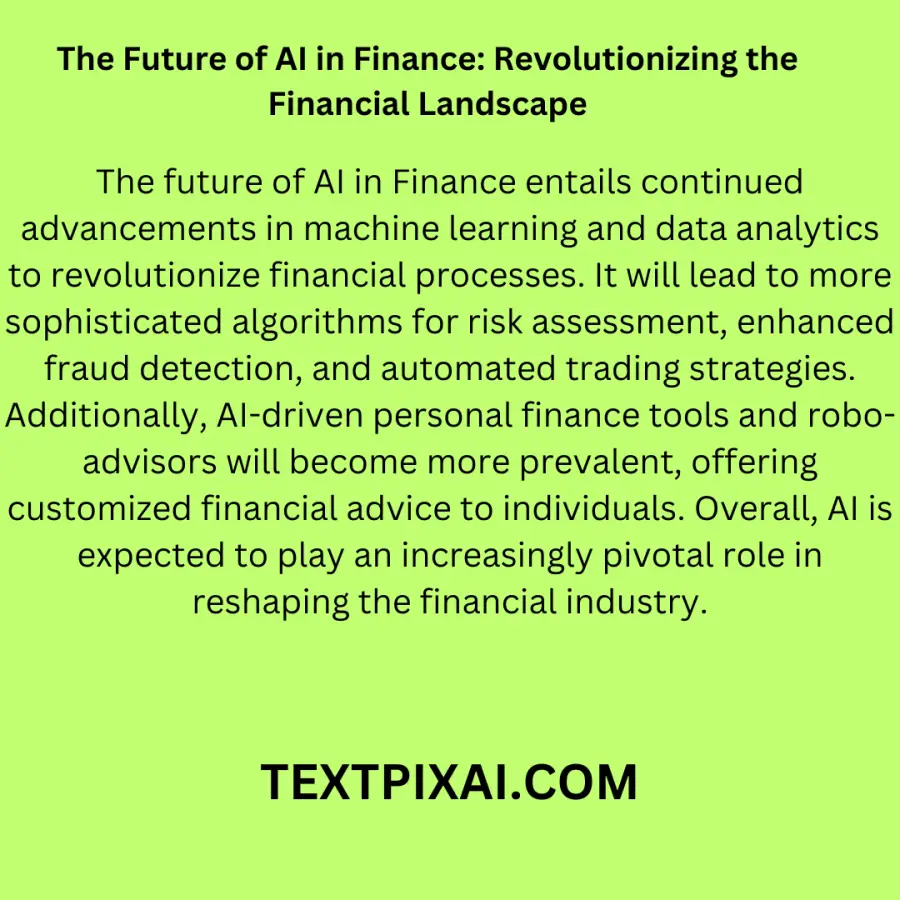The Future of AI in Finance: Revolutionizing the Financial Landscape
Introduction
The financial world is on the brink of a monumental transformation, thanks to the integration of Artificial Intelligence (AI). In this article, we will delve into the captivating realm of the "Future of AI in Finance." With AI's remarkable ability to process vast datasets, learn from them, and make data-driven decisions, it's poised to revolutionize every aspect of the financial sector. Let's embark on this journey to explore how AI is reshaping banking, investments, and much more.
Future of AI in Finance: A Glimpse into Tomorrow
The future of AI in finance promises to be nothing short of extraordinary. This section provides an overview of the groundbreaking changes that await us.
AI-Powered Banking Solutions
Traditional banking methods are evolving rapidly, thanks to AI. Banks are deploying AI algorithms for customer service, fraud detection, and even personal finance management. AI-driven chatbots provide immediate assistance, while predictive analytics enhance risk management, making banking more efficient and customer-centric.
Investment Management and AI
Investors are increasingly turning to AI-powered tools for guidance. Machine learning algorithms analyze market trends and historical data to recommend investment opportunities. Robo-advisors offer diversified portfolios tailored to individual risk tolerance, democratizing access to wealth management.
Blockchain and Cryptocurrency
AI's synergy with blockchain technology is poised to reshape the cryptocurrency landscape. AI algorithms are improving security and scalability while enhancing cryptocurrency trading strategies. This fusion opens doors to a more stable and efficient digital economy.
AI in Risk Assessment
Lenders and insurance companies are harnessing AI to assess risk more accurately. Machine learning models process diverse data sources, enabling lenders to make informed credit decisions. Similarly, AI enhances fraud detection, reducing financial losses.
The Future of Banking Branches
AI-driven automation is altering the concept of physical bank branches. With self-service kiosks and AI-assisted customer support, banks are reducing operational costs while providing convenient services 24/7. The brick-and-mortar branch is becoming a hub for personalized financial consultations.
You may also like to read:
AI in Security and Surveillance: Safeguarding the Future
AI and Regulatory Compliance
Regulatory compliance is a critical aspect of the financial industry. AI simplifies compliance by monitoring transactions in real-time, flagging suspicious activities, and ensuring adherence to evolving regulations. This not only reduces compliance costs but also minimizes the risk of penalties.
AI-Powered Customer Insights
Understanding customer behavior is pivotal for financial institutions. AI analytics tools help in deciphering customer preferences and tailoring products and services accordingly. This leads to increased customer satisfaction and loyalty.
AI and High-Frequency Trading
High-frequency trading strategies are becoming more sophisticated with AI. Algorithms analyze market conditions and execute trades within milliseconds, capitalizing on minute price differentials. This trend is reshaping the trading landscape.
AI and Personal Finance
Personal finance management is becoming more accessible with AI-driven apps. These apps track expenses, set budgets, and provide financial advice, empowering individuals to make informed financial decisions.
AI in Wealth Management
Wealth management is no longer exclusive to the affluent. AI-powered platforms offer investment advice and portfolio management services at lower fees, making wealth management accessible to a broader audience.
Cybersecurity and AI
As financial institutions move towards digitization, the importance of cybersecurity cannot be overstated. AI plays a crucial role in identifying and mitigating cyber threats, safeguarding sensitive financial data.
AI and Credit Scoring
Credit scoring is evolving with AI. Machine learning models analyze alternative data sources such as social media behavior and utility payments, enabling a more comprehensive assessment of creditworthiness.
AI-Enhanced Customer Support
AI-driven customer support is redefining user experiences. Chatbots and virtual assistants provide quick responses and solutions, reducing wait times and enhancing customer satisfaction.
AI and Portfolio Optimization
AI-driven portfolio optimization tools constantly adjust investment portfolios based on market conditions, ensuring optimal returns for investors.
The Ethical Dimensions
As AI's role in finance expands, ethical considerations come to the forefront. Ensuring fairness, transparency, and accountability in AI-driven financial systems is a challenge that the industry must address.
AI in Insurance
The insurance sector is embracing AI for risk assessment, claims processing, and customer engagement. AI streamlines insurance processes and improves the accuracy of underwriting decisions.
AI and Financial Inclusion
AI has the potential to expand financial inclusion by providing services to underserved populations. Mobile banking apps and AI-driven microloans are breaking down traditional barriers to access.
AI in Trading Algorithms
Trading algorithms powered by AI analyze vast datasets in real-time, identifying market inefficiencies and executing trades with precision.
AI and Regulatory Reporting
AI automates the complex process of regulatory reporting, reducing errors and ensuring compliance with evolving financial regulations.
AI-Driven Predictive Analytics
Predictive analytics powered by AI help financial institutions forecast market trends, assess credit risk, and make informed strategic decisions.
AI in Real-Time Fraud Detection
AI's ability to detect unusual patterns and anomalies in real-time is crucial in mitigating fraud risks for both financial institutions and customers.
AI and Mortgage Lending
AI streamlines mortgage lending processes by automating document verification, credit checks, and assessing borrower eligibility.
AI-Enhanced Trading Platforms
AI-powered trading platforms provide traders with data-driven insights, helping them make better-informed trading decisions.
AI and Financial Education
AI-driven educational tools are enhancing financial literacy by providing personalized learning experiences and guidance.
FAQs: The Future of AI in Finance
How is AI changing the face of banking?
AI is revolutionizing banking by enhancing customer service, automating processes, and improving risk management.
Can AI help me make better investment decisions?
Absolutely. AI-powered robo-advisors analyze market data to recommend investment opportunities based on your risk tolerance.
What role does AI play in cryptocurrency?
AI enhances security, scalability, and trading strategies in the cryptocurrency space, making it more efficient and secure.
How does AI improve risk assessment in lending?
AI uses machine learning to assess credit risk by analyzing diverse data sources, leading to more accurate lending decisions.
Is AI making traditional bank branches obsolete?
Not obsolete, but transformed. AI-driven automation is making traditional branches more efficient, offering 24/7 services.
How does AI impact regulatory compliance?
AI ensures real-time monitoring of transactions, flagging suspicious activities, and simplifying compliance with evolving regulations.
Conclusion: A Bright Future Awaits
The future of AI in finance holds immense promise. From AI-powered banking to enhanced investment opportunities and improved risk management, it's reshaping the financial landscape. However, as we embrace these changes, ethical considerations must guide us. With the right balance, AI can usher in a future where finance is more accessible, efficient, and secure for everyone.








